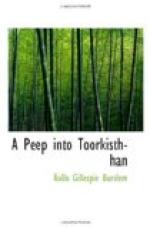A bridle-path conducted us for some miles along the edge of a gentle stream, whose banks were clothed with long luxuriant grass extending on either side for a few hundred yards; we proceeded rapidly at first, keeping our horses at a hand gallop, as the path was smooth, and also to escape from the myriads of forest-flies or blood-suckers which were perpetually hovering around us, and irritating our cattle almost to madness whenever we were obliged to slacken our pace; our tormentors, however, did not pursue us beyond the limits of the pasture land, so that we were glad to exchange the beauties of the prairie for the stony barren ground which succeeded it. We soon reached the base of a hill from whence the wished-for cavern was visible, situated about half-way up its face. We were now obliged to dismount, and leaving our horses under the charge of an Uzbeg, who could hardly conceal his delight at being selected for the least dangerous duty, we commenced the ascent.
During our ride I had endeavoured to gather a few more particulars concerning the dreaded cavern, and as might have been expected, the anticipated horrors dwindled away considerably as we approached it; still enough of the marvellous remained to keep my curiosity on the stretch. Shah Pursund Kh[=a]n confessed that he was not positive that the devil actually lived there, but still, he said, it was very probable; he had first heard of the existence of the cave when he obtained possession of the Do[=a]ub twelve years ago, from the very moollah who was our informant. Urged by a curiosity similar to our own, he had ventured some little distance inside, but suddenly he came upon the print of a naked foot, and beside it another extraordinary impression, which he suspected to be from the foot of sheittan (the devil) himself; quite satisfied that he had gone far enough, he retreated precipitately, and from that day to this had never intruded again. He argued that any human being living in the cave would require sustenance, and of course would purchase it at his fort, which was the only one where the necessaries of life could be procured for many miles around; but he knew every one who came to him, and no stranger had ever come on such an errand; he therefore concluded with an




